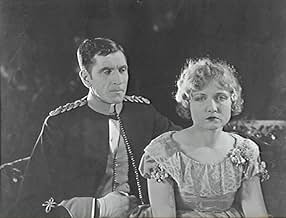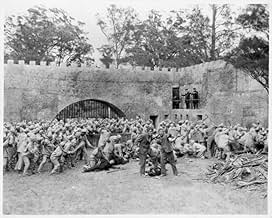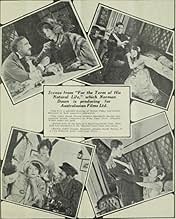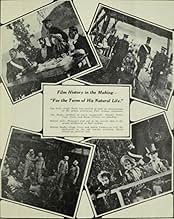A convict, wrongfully accused and sent a harsh prison colony, attempts to escape.A convict, wrongfully accused and sent a harsh prison colony, attempts to escape.A convict, wrongfully accused and sent a harsh prison colony, attempts to escape.
Fred Twitchin
- Pine - Surgeon
- (as Fred Twitcham)
- Director
- Writers
- All cast & crew
- Production, box office & more at IMDbPro
Storyline
Did you know
- TriviaA real sailing ship was burned for the climax. Called the "Inca", it was loaded with dynamite and nitrate film. The effect was spectacular, but countless early Australian films were lost in the blaze.
- GoofsOn two intertitles, Van Diemen's Land is misspelled as 'Van Dieman's Land'.
- ConnectionsFeatured in Forgotten Cinema: The Golden Age of Australian Motion Pictures (1967)
Featured review
This is an amazing silent film to watch because of its scope and grand scale. For a Hollywood production, this would have been very impressive. But, being an Australian film, it's simply amazing. Sadly, however, despite there being so much to admire from this film, the plot, even by 1927 standards, was hopelessly permeated with holes--very, very serious plot holes.
The film begins in England in the 1920s. A young man (Rufus Dawes) has just had an argument with his wealthy father. And, in his anger, the son is disowned AND informed that he is illegitimate! Apparently his mother was pregnant when they married. So, he's now homeless and life couldn't possibly suck and more...or could it?! On the way from the manor, he comes upon a guy who was beaten and robbed and offered him assistance. Sadly, the man dies AND when help comes, they think the young man is responsible and he's sentenced to be sent to the prison colonies in Australia. Oddly, there was a witness to this but the guy stayed hidden--not revealing himself. Frankly, this made no sense at all. Even when the reason why the witness didn't speak up was later revealed, the reason seemed lame AND there were so many chances for him to make things right. Plus, the witness had become a preacher--so why wouldn't this guy speak up about what he saw?!?! Duh.
On the way to Australia, there is a shipboard mutiny and the prisoners, led by the evil John Rex, try to take over. One of the prisoners, Dawes, manages to thwart the rebellion and save the day. His reward? NOTHING! Once at the colony, Dawes is a model prisoner and Rex is a big bad meanie. Oddly, the two men look a lot alike--almost like brothers (yes, it will eventually turn out that they actually are--what are the odds?!?!?!?!). Eventually, the colony is moved and the prisoners and non-prisoners leave on two ships. One ship is hijacked by the prisoners. Now you'd THINK they would have learned their lesson about this the first time...but no.
Dawes and three others are set adrift by the mutineers. While it looks like they will starve or die from the elements, Dawes alone is able to keep most of them alive using his selfless courage. When they are rescued, his reward is...NOTHING! And, in a very stupid plot element, this is because the pretty young lady who survives has a mysterious case of amnesia. And so the wimpy and not at all helpful officer who is stranded with them claims HE was the reason they survived and Dawes is sent right back to hard labor!! And, for the next decade or so, this young lady cannot recall what happened during their stranding!! This is ridiculous. Unless she had a massive head injury or was a dope fiend, she would have remembered Dawes' kindness.
Years pass and lots of crazy things happen in the plot. The film even goes back to England, has a shipwreck and the minister FINALLY gets around to telling everyone the truth---two decades later!!! The problem is that on one hand the film is very exciting and has a lot of plot elements in it (enough for two or three films), much of what happens strains all credibility...even for a film made in 1927. Seeing the crime committed but not getting around to telling anyone what really happened for almost 20 years, a lady who conveniently forgets AND, uggh, when it turns out Rex and Dawes are BROTHERS, the viewer is left conflicted. It's a great film but it's also a series of crazy clichés. Well worth seeing...but try to buy into the "Les Miserables"-like plot as best you can despite the plot holes.
Oh, and by the way, like many older films, the print is a mess in places. Bits and pieces of the film are missing and are replaced by stills and descriptive intertitle cards that explain what you can't see. Other films that needed such restorations work would include Capra's "Lost Horizon" and Laurel and Hardy's "The Battle of the Century", as nitrate prints tend to decay, melt or even explode unless kept in 100% perfect conditions.
The film begins in England in the 1920s. A young man (Rufus Dawes) has just had an argument with his wealthy father. And, in his anger, the son is disowned AND informed that he is illegitimate! Apparently his mother was pregnant when they married. So, he's now homeless and life couldn't possibly suck and more...or could it?! On the way from the manor, he comes upon a guy who was beaten and robbed and offered him assistance. Sadly, the man dies AND when help comes, they think the young man is responsible and he's sentenced to be sent to the prison colonies in Australia. Oddly, there was a witness to this but the guy stayed hidden--not revealing himself. Frankly, this made no sense at all. Even when the reason why the witness didn't speak up was later revealed, the reason seemed lame AND there were so many chances for him to make things right. Plus, the witness had become a preacher--so why wouldn't this guy speak up about what he saw?!?! Duh.
On the way to Australia, there is a shipboard mutiny and the prisoners, led by the evil John Rex, try to take over. One of the prisoners, Dawes, manages to thwart the rebellion and save the day. His reward? NOTHING! Once at the colony, Dawes is a model prisoner and Rex is a big bad meanie. Oddly, the two men look a lot alike--almost like brothers (yes, it will eventually turn out that they actually are--what are the odds?!?!?!?!). Eventually, the colony is moved and the prisoners and non-prisoners leave on two ships. One ship is hijacked by the prisoners. Now you'd THINK they would have learned their lesson about this the first time...but no.
Dawes and three others are set adrift by the mutineers. While it looks like they will starve or die from the elements, Dawes alone is able to keep most of them alive using his selfless courage. When they are rescued, his reward is...NOTHING! And, in a very stupid plot element, this is because the pretty young lady who survives has a mysterious case of amnesia. And so the wimpy and not at all helpful officer who is stranded with them claims HE was the reason they survived and Dawes is sent right back to hard labor!! And, for the next decade or so, this young lady cannot recall what happened during their stranding!! This is ridiculous. Unless she had a massive head injury or was a dope fiend, she would have remembered Dawes' kindness.
Years pass and lots of crazy things happen in the plot. The film even goes back to England, has a shipwreck and the minister FINALLY gets around to telling everyone the truth---two decades later!!! The problem is that on one hand the film is very exciting and has a lot of plot elements in it (enough for two or three films), much of what happens strains all credibility...even for a film made in 1927. Seeing the crime committed but not getting around to telling anyone what really happened for almost 20 years, a lady who conveniently forgets AND, uggh, when it turns out Rex and Dawes are BROTHERS, the viewer is left conflicted. It's a great film but it's also a series of crazy clichés. Well worth seeing...but try to buy into the "Les Miserables"-like plot as best you can despite the plot holes.
Oh, and by the way, like many older films, the print is a mess in places. Bits and pieces of the film are missing and are replaced by stills and descriptive intertitle cards that explain what you can't see. Other films that needed such restorations work would include Capra's "Lost Horizon" and Laurel and Hardy's "The Battle of the Century", as nitrate prints tend to decay, melt or even explode unless kept in 100% perfect conditions.
- planktonrules
- Feb 1, 2010
- Permalink
Details
- Release date
- Country of origin
- Language
- Also known as
- Életfogytiglan
- Filming locations
- Port Arthur, Tasmania, Australia(location)
- Production company
- See more company credits at IMDbPro
- Runtime1 hour 41 minutes
- Sound mix
- Aspect ratio
- 1.33 : 1
Contribute to this page
Suggest an edit or add missing content

Top Gap
By what name was For the Term of His Natural Life (1927) officially released in Canada in English?
Answer





















